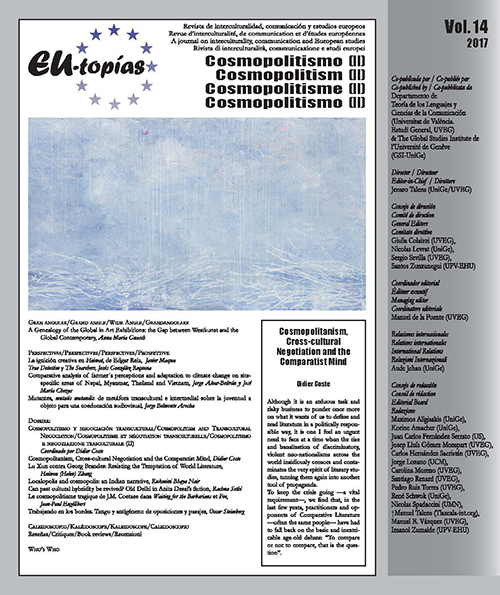Mutants, mutatis mutandis: from cross-cultural and intermedial metaphor about youth to object for audiovisual co-education
DOI:
https://doi.org/10.7203/eutopias.0.18595Keywords:
Comic, cinema, television fiction, mutants, cross-cultural and intermedial metaphor, youth, audiovisual co-education Abstract
Abstract
The concept of mutant, as a cross-cultural and intermedial metaphor for youth, is typical of intermedial (comic, film, television) and transcultural fictions (originated in the United States but exported and/or recreated to/all around the world) on mutant young characters, as they were defined in the context of the superheroic narrative genre. In its graphic version (young mutants born with a genetic alteration as a consequence of which they develop superpowers), the concept was popularized by the Marvel American superhero comic during the 60s and, afterwards perpetuated (trans)culturally through different types of narratives until nowadays. They were comics dedicated to young mutants, and gave origin, directly or indirectly, to a number of intermedial stories that are inspired by them. This article covers comic, cinema and television fictional texts about different mutant characters (masculine and feminine), broadly and critically analyzing them as a metaphor about youth.
 Downloads
Downloads
 References
References
Arribas, Sonia (2008), «Cornelius Castoriadis y el imaginario político», Foro interno: anuario de teoría política, 8, pp. 105-132.
Belmonte, Jorge (2015a), «Fantasías sobre feminidad, fatalidad y mutación: del cómic al imaginario de la cultura audiovisual», Dossiers Feministes, 20, pp. 141- 156.
Belmonte, Jorge (2015b), «Ficciones audiovisuales y políticas postelevisivas de la (des) memoria histórica en la cultura española», Revista F@ ro, 1(21), pp. 53-71.
Bergua, Jose Angel (2007), Lo social instituyente, Zaragoza: Prensas Universitarias de la Universidad de Zaragoza.
Blanco, Nelly Brigida (2011), «La película X-MEN III La batalla final: análisis desde una perspectiva filosófica», Hermeneutic, 10, pp. 1-26.
Burch, Noël (1987), El tragaluz del infinito, Madrid: Cátedra.
Colaizzi, Giulia (2007), La pasión del significante, Madrid: Biblioteca Nueva.
Doane, Mary Ann (1991), Femmes Fatales, New York: Routledge.
Freud, Sigmund (1979), El yo y el ello (1923-1925). Obras completas, Buenos Aires: Amorrortu.
Lotman, Yuri (1999), Cultura y explosión, Barcelona: Gedisa.
Montesinos, David (2007), La juventud domesticada, Madrid: Editorial Popular.
Negri, Antonio (2007), «El monstruo político. Vida desnuda y potencia», Gabriel Giorgi y Fermín Rodríguez (ed.), Ensayos sobre biopolítica: excesos de vida, Buenos Aires: Paidós, pp. 93-140.
Pedraza, Pilar (1991), La bella, enigma y pesadilla, Barcelona: Tusquets.
Talens, Jenaro (2005), «Políticas y laberintos del imaginario. Drácula como síntoma», Jesús Angel Baca y Alfonso Galindo (ed.), El cine y lo siniestro, Almería: Diputación de Almería, pp. 122-150.
Downloads
Published
How to Cite
-
Abstract535
-
PDF (Español)138
Issue
Section
License
![]()
The authors conserve the copyright. All content published in EU-topías. Journal of interculturality, Communication, and European Studies are subject to the license Creative Commons Attribution-NonCommercial-ShareAlike 4.0 license. The full text of the license can be found at <http://creativecommons.org/licenses/by-nc-sa/4.0>
They may be copied, used, disseminated, transmitted and publicly displayed, provided that:
- The authorship and original source of the publication is cited (journal, publisher and URL of the work).
- They are not used for commercial purposes.
- The existence and specifications of this license of use are mentioned.
It is the responsibility of the authors to obtain the necessary permissions for images that are subject to copyright.



